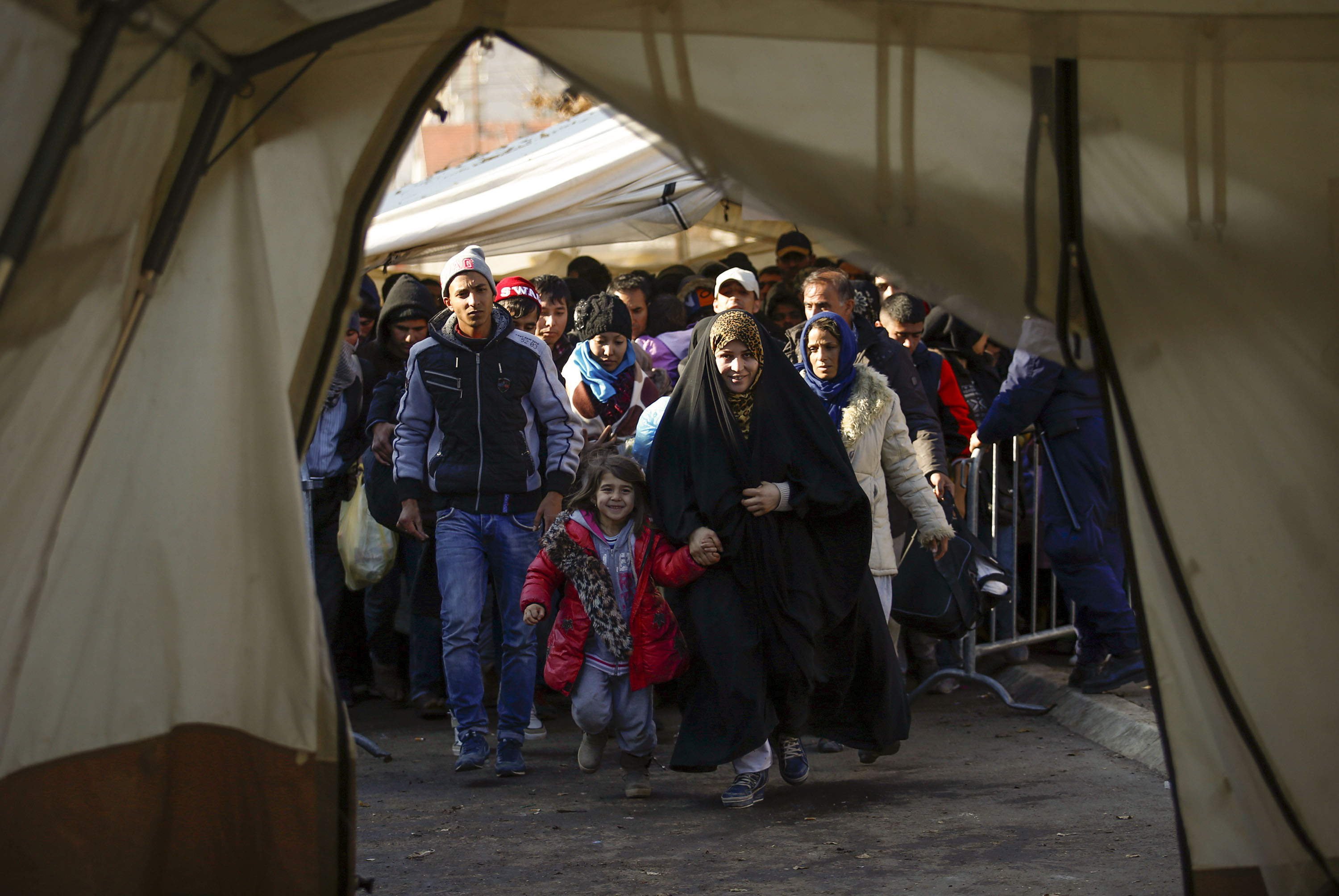The Christian case for opening America's doors to Syrian refugees
The toxic racism displayed by some of the GOP's leading presidential candidates is anything but Christian


A free daily email with the biggest news stories of the day – and the best features from TheWeek.com
You are now subscribed
Your newsletter sign-up was successful
In the wake of Friday's horrific terrorist attacks in Paris, many leading GOP presidential candidates have adopted a belligerent, offensive tone toward the idea of accepting Syrian refugees into the U.S. To wit, Donald Trump:
What is our President doing?A video posted by Donald J. Trump (@realdonaldtrump) on Nov 17, 2015 at 7:35am PST
"Refugees are pouring into our great country from Syria. We don't even know who they are. They could be ISIS, they could be anybody. What's our president doing — is he insane?" Trump demanded.
Let's set aside the fact that no aspect of Trump's statement is accurate. Instead, let's have a good, hard look at why so many American Christians seem to agree with Trump, adopting an attitude of complete hostility toward the very idea of accepting Syrians into our country — and why they're wrong.
The Week
Escape your echo chamber. Get the facts behind the news, plus analysis from multiple perspectives.

Sign up for The Week's Free Newsletters
From our morning news briefing to a weekly Good News Newsletter, get the best of The Week delivered directly to your inbox.
From our morning news briefing to a weekly Good News Newsletter, get the best of The Week delivered directly to your inbox.
There are a few reasons why Christians argue America should keep Syrian refugees out.
- My responsibility to protect my family negates any calling to help "potential terrorists." Our own children come first.
- You can't apply scripture to government. The government is a nation-state, not a theocracy, so the Bible doesn't apply here.
- The U.S. is not to blame for radicalism. So unless we can find a really good way to vet refugees, we aren't responsible for providing aid.
Many of these people are operating out of an understandable sense of fear. Last week's terrorist attacks in France have left many in the U.S. on edge, anxious for their families both at home and abroad. Yet to respond with indiscriminate rejection to the millions of refugees in need of shelter is the wrong response. And it is a decidedly un-Christian response.
Let's address the first claim (that if you are a Christian, you are excused from helping others if doing so might put your family in danger). The Bible provides the best counters.
"The stranger who dwells among you shall be to you as one born among you, and you shall love him as yourself; for you were strangers in the land of Egypt: I am the Lord your God." [Leviticus 19:34]"If you extend your soul to the hungry and satisfy the afflicted soul, then your light shall dawn in the darkness, and your darkness shall be as the noonday." [Isaiah 58: 10]"'I will come near you for judgment; I will be a swift witness against sorcerers, against adulterers, against perjurers, against those who exploit wage earners and widows and orphans, and against those who turn away an alien — because they do not fear Me,' says the Lord of hosts." [Malachi 3:5]"Then the King will say to those on His right hand, 'Come, you blessed of My Father, inherit the kingdom prepared for you from the foundation of the world: for I was hungry and you gave Me food; I was thirsty and you gave Me drink; I was a stranger and you took Me in; I was naked and you clothed Me; I was sick and you visited Me; I was in prison and you came to Me.' Then the righteous will answer Him, saying, 'Lord, when did we see You hungry and feed You, or thirsty and give You drink? When did we see You a stranger and take You in, or naked and clothe You? Or when did we see You sick, or in prison, and come to You?' And the King will answer and say to them, 'Assuredly, I say to you, inasmuch as you did it to one of the least of these My brethren, you did it to Me.'" [Matthew 25:34-40]
As the verse in Malachi points out, those who "turn away an alien" are putting their fear of man above their fear of God. We as Christians must ask ourselves who we fear most — God or man? When we allow the cruelty of terrorists to override our compassion for the refugee, who is winning? And are we willing to face the spiritual — the eternal — consequences of such a decision?
A free daily email with the biggest news stories of the day – and the best features from TheWeek.com
As to the second argument (that America is not a theocracy, so scripture doesn't apply): Eighty-three percent of Americans identify as Christian. And we cannot shrug off our duty as Christians by claiming the government that represents us is not bound in some way by our beliefs.
We live in a democracy in which citizens can exert influence on their government, or act on their own. There's no reason why a body of Christian citizens couldn't rise up — in the way the people of Iceland did—and say we are willing to take in refugees, putting pressure on the government to allow us to do so.
ISIS is committing horrific atrocities, from their torture brigades to their "theology of rape." ISIS's actions are condemnable by natural law and by the human conscience. Regardless of one's religion (or lack thereof), such indignities against human dignity and life should be seen as inexcusable. We should do everything in our power to rescue innocent people from such horrific situations.
In response to the third argument from anti-refugee Christians (that we aren't to blame for radicalism, and therefore are not responsible for helping its victims): The West's past military interventions in the Middle East have certainly been a factor in the destabilization that gave rise to ISIS. In this view, we are duty-bound to offer a home to those we have, in essence, displaced through our military campaigns. As Scott McConnell wrote for The American Conservative in September:
By one not unreasonable estimate, as many as four million Muslims have died or been killed as a result of the ongoing conflicts that Washington has either initiated or been party to since 2001. There are, in addition, millions of displaced persons who have lost their homes and livelihoods, many of whom are among the human wave currently engulfing Europe. There are currently an estimated 2,590,000 refugees who have fled their homes from Afghanistan, 370,000 from Iraq, 3,880,000 million from Syria, and 1,100,000 from Somalia.… Significantly, the countries that have generated most of the refugees are all places where the United States has invaded, overthrown governments, supported insurgencies, or intervened in a civil war. The invasion of Iraq created a power vacuum that has empowered terrorism in the Arab heartland. Supporting rebels in Syria has piled Pelion on Ossa. Afghanistan continues to bleed 14 years after the United States arrived and decided to create a democracy. Libya, which was relatively stable when the U.S. and its allies intervened, is now in chaos, with its disorder spilling over into sub-Saharan Africa....Though I recognize that the refugee problem cannot be completely blamed on only one party, many of those millions would be alive and the refugees would for the most part be in their homes if it had not been for the catastrophic interventionist policies pursued by both Democratic and Republican administrations in the United States. [The American Conservative]
Some Christians believe we should have intervened more forcefully in Syria two years ago, and that our lack of "leadership" then encouraged ISIS's rise to power. But even so, the above obligation to help would still apply.
We Christians must keep in mind the consequences of our words and actions. Calls to ban refugees are not only un-Biblical — they are incredibly damaging. They paint us as hostile people who will discriminate without thought or question. If we decide that we will only open our doors to fellow Christians, it conveys the idea that we care only for our own, and disdain the suffering worldwide unless they're "one of us." In the scriptures quoted above, God made no qualifications for nationality, religion, or security. There was no asterisk, no escape clause. Only "inasmuch as you did it to one of the least of these My brethren, you did it to Me."
We are in danger of a globalized indifference, of letting concern for our own safety completely blind us to the perils and pains facing our brothers and sisters, and to our obligation as Christians to help these people.
Allow me to quote one more verse — one of the most basic and widely believed of them all. Jesus told us to "do unto others as you would have them do unto you." That should be the Christian approach to this humanitarian disaster.
Gracy Olmstead is a writer and journalist located outside Washington, D.C. She's written for The American Conservative, National Review, The Federalist, and The Washington Times, among others.
